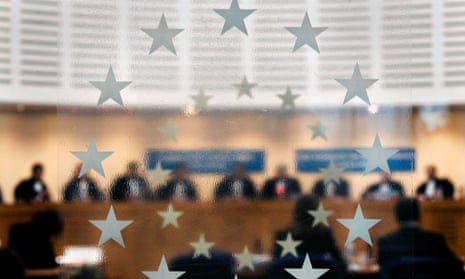David Cameron has given Michael Gove the task of scrapping the Human Rights Act and curtailing the role of the European court of human rights. Gove, the new justice secretary, is probably unaware of how poisonous are the contents of the chalice passed into his hands. And Cameron wants a draft bill within the first 100 days of his new government.
Adopted in 1998, the Human Rights Act incorporated into British law the European convention on human rights – one of the great international legal instruments of the 20th century – along with the UN charter. Reflecting Winston Churchill’s second world war aim of achieving the “enthronement of human rights”, it holds the governments of 47 European countries to account, offering individuals rights and protections against governmental excesses, including freedom of expression, fair trials and the prohibition of torture. Significantly, the 1998 act allowed UK courts, for the first time to interpret and apply the convention, requiring them to “take account” of the judgments of the European court of human rights in Strasbourg, but not to be bound by them (as is the case for judgments of the parallel EU court of justice in Luxembourg).
The act and the European convention are hated by some prominent Conservatives, but by no means all. They would like to get rid of the act and the Strasbourg court, although quite what they would replace them with is unstated. They propose a “British bill of rights” but do not know what it would contain, how it might work, and how – if at all – it would relate to the European convention. All we know is that its proponents wish that foreign criminals could “be more easily deported from Britain”, and that the supreme court was the “ultimate arbiter of human rights matters in the UK”.
I served on the last government’s ill-fated commission on a bill of rights, set up by Cameron and Nick Clegg. I approached my role with an open mind. What I cared about was that the UK should remain a party to the convention. In the course of our deliberations, it became clear that three of the four Tory commission members appointed by Cameron, actively wished for the UK to leave the convention, and that one aim of their British bill was to facilitate that objective. That desire, not publicly expressed in the face of opposition around the country, led me to join Helena Kennedy in departing from the majority and opposing a British bill of rights.
Our commission engaged in a wide-ranging consultation, which made crystal-clear the overwhelming public support across the UK for continued adherence to the convention and the aims of the 1998 act. We also found no strong objection to the Strasbourg court, given the vital role it plays in guarding against abuses of the kind that plagued Europe in the 1930s and 1940s. To be clear, I don’t like some of its judgments, but they are a reason for persuading the court to change tack, not for destroying it. Our commission visited Northern Ireland, Scotland and Wales and found literally no one who had any objection to the current arrangements. The position was not much different elsewhere.
A further issue is that the 1998 act is embedded in the devolution arrangements for Scotland and Wales, and the Good Friday agreement guarantees that Britain will incorporate the European convention into Northern Ireland’s law. Repealing the 1998 act would drive a coach and horses through these arrangements. The Tory appointees were unable to find a way to address this, short of recognising that people in different parts of the UK may have different human rights, depending on which side of a border they happened to live. Such an approach would be calamitous if you care about maintaining the union.
Even assuming a way can be found to address all these matters in 100 days – a tall order, given that eight of us couldn’t find a way in 700 days – what would a bill of rights contain? My four Tory friends on the commission couldn’t agree on that either.
That said, Martin Howe QC produced a draft bill which gives a frightening hint of what some may have in mind: he proposes that the rights of any individual would depend on whether they were a British citizen (full fundamental rights), an EU national (fewer rights) or a foreigner (even fewer rights). Such an approach is inconsistent with the very notion of fundamental human rights, in which every human being has basic minimum rights.
Cameron has now declared himself to be a “one-nation” Tory, committed to the maintenance of the union. But abandoning the convention and adopting Howe’s proposals would be deeply divisive, and would surely speed up the dissolution of the United Kingdom. If Gove is clever, he will delay matters until after an EU referendum and after the government has sorted out its approach to devolution, making it clear that withdrawal from the convention is off the table. On this basis there can be a sensible debate across all parties, dealing with the realities of constitutional change.
Basic human rights, as listed in the convention, must surely apply equally across the UK. And rather than Strasbourg being a problem, there is now considerable evidence that judgments in the UK courts influence decisions taken in Strasbourg. Changes on particular rights can be achieved without destroying the convention and Britain’s global leadership in international human rights law. Michael Gove is entitled to some time to get to know the landscape. If he listens to all views in his own team, he could still achieve change and at the same time enhance the UK’s role in Europe and beyond.
